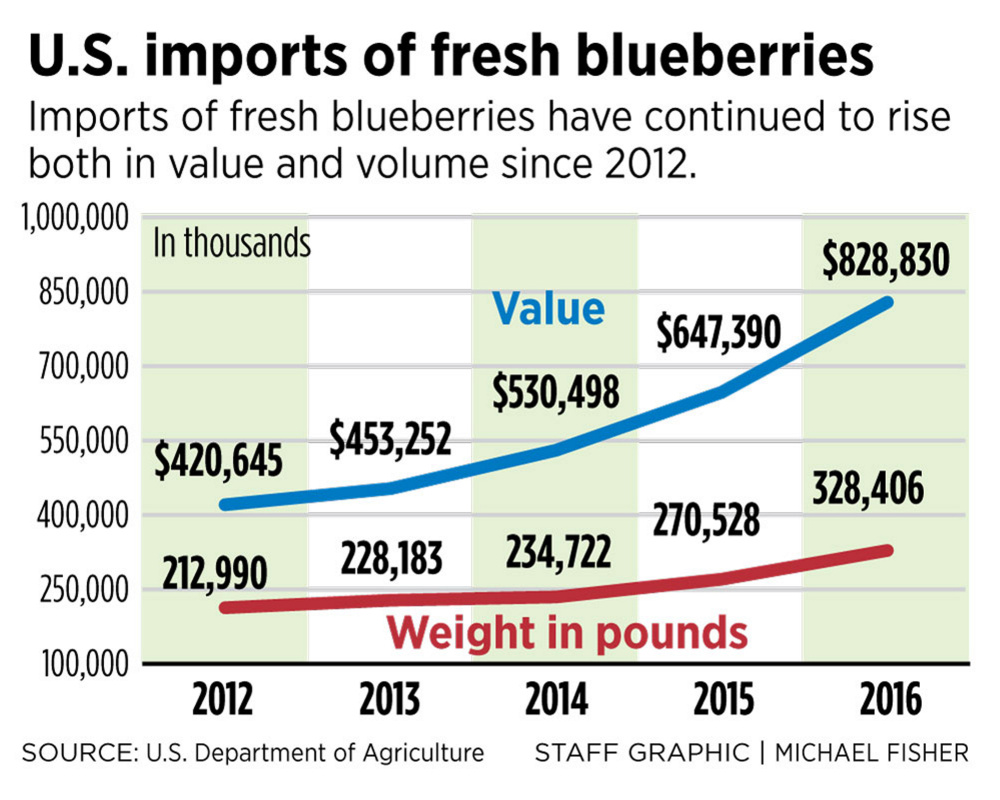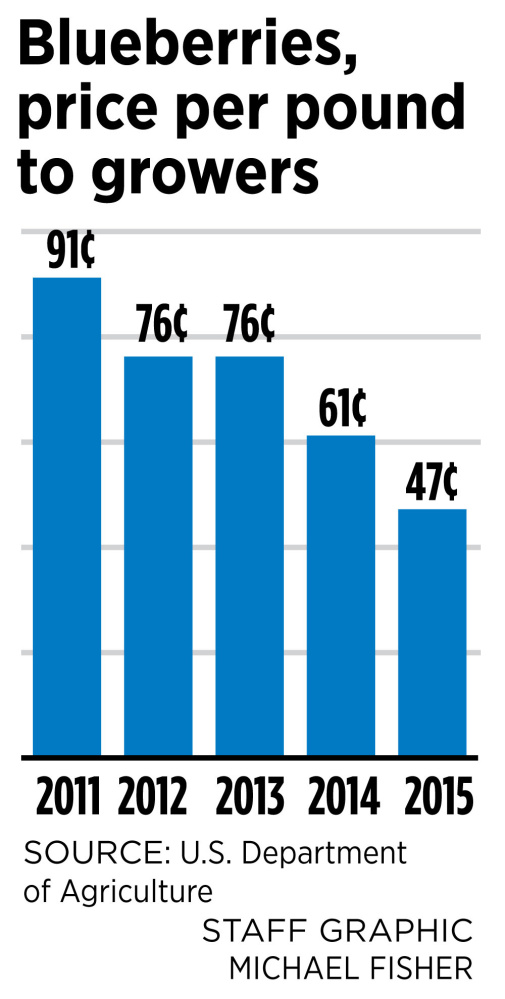Members of Maine’s agriculture industry and state government fear the possibility of losing blueberry growers because of a depression in prices that has made growing the beloved crop a less reliable way to make a living.
Wild blueberries are a Maine tradition on par with lobsters and lighthouses, but prices to farmers have plunged from nearly a dollar a pound in 2011 to around 25 to 30 cents per pound last year. The number of farmers and acreages is holding steady, but other measures show a decline in effort on farms, state officials said.
For example, bees are imported to Maine to pollinate blueberry fields, and the number of beehives coming into the state declined by about 20 percent from 2015 to 2016, said David Yarborough, a horticulture professor at the University of Maine.
Industry members said they are likely looking at another year of low prices, and some farmers are using less of their fields in anticipation of a tough summer.
“These are challenging times for the blueberry industry,” said Homer Woodward, vice president of Jasper Wyman & Son, one of the Maine blueberry industry’s major players. “Everyone is trying to rethink their farm management plan.”
Gov. Paul LePage, a Republican, has submitted a state budget proposal that would use $2.5 million in state money to market agricultural products such as blueberries. He and others have said the state needs to find new buyers for the blueberries to try to spur demand and buoy prices. State officials say wild blueberry growers in Washington and Hancock counties, the heart of blueberry country, are seeing annual losses of $70 million.
Republican Sen. Paul T. Davis Sr. of Sangerville, co-chairman of the Legislature’s Agriculture, Conservation and Forestry Committee, said more could be done to promote the nutritional benefits of wild blueberries, a rich source of antioxidants. Antioxidants have been scientifically proved to protect the body from diseases such as cancer, and other age-related health risks.
“There are so many good things about blueberries. They are very good for you,” Davis said Sunday evening in a telephone interview. “Maybe we should do more marketing of the wild blueberry.”
Davis said if more people become aware of its health benefits, more will buy the fruit, which in turn could help drive prices up.
“We need to be concerned. Blueberry growing is a big industry in Maine, especially in Washington County,” Davis pointed out.
Davis said he is not sure what his legislative committee could do to help, but he said he plans to raise the issue at the committee’s meeting on Monday.
Better than expected harvests
One of the reasons for the drop in prices and profits is a multi-year boom in harvest that has led to surplus. Maine’s wild blueberry crop in 2016 was better than expected despite a drought that hit some sectors of New England’s agriculture industry hard.
Maine, the largest wild blueberry-producing state in the nation, hit its five-year average of 93 million pounds last summer.
The U.S. Department of Agriculture stepped in last year and allotted up to $13 million to buy surplus Maine blueberries and help stabilize prices. But excess supply remains.
Another problem is that Canada also produces wild blueberries and it’s difficult for Maine companies to compete with the country economically because of the weak Canadian dollar.
Wild blueberries are not as common in stores as the fatter cultivated blueberries, but fans of the fruit tout its unique flavor profile and higher level of antioxidants. About 99 percent of the crop is frozen, and it is widely used as a food ingredient, such as in smoothies.
Canada and Maine, the U.S.’s sole significant wild blueberry state, have both churned out high levels of the crop in recent years, Yarborough said.
The two jurisdictions produced 400 million pounds of wild blueberries last year, Yarborough said. The norm is around 250 million pounds, he said. Regardless of the size of this summer’s crop, prices are unlikely to surge back to higher levels quickly, Yarborough added.
“This particular situation isn’t going to resolve itself in a year or two. It might take longer,” he said.
The drop in prices to farmers hasn’t trickled down to retail customers yet, except in the form of occasional sales and coupons, Woodward said. He said growers and processors are hoping the state’s push to more aggressively market the blueberries will attract new interest outside the state.
Maine Agriculture Commissioner Walt Whitcomb said the state hopes to market blueberries more aggressively overseas and increase efforts to get Maine blueberries into more U.S. schools.
The school push has yielded some results, as more frozen Maine wild blueberries were sold to schools in April than in all of 2016. In the 2017-18 school year, Maine wild blueberries will be served in public school systems in 19 states.
Maine’s wild blueberry industry has been looking to schools to boost sales after several years of surplus crops. Contributing to the boost is a marketing effort that has targeted state food service directors funded through a $50,000 grant from the Maine Department of Agriculture, Conservation and Forestry.
Meanwhile, wild blueberry growers like Larry Scott, who operates Scott’s Blueberry Hill Farm in Waldoboro, are doing everything they can to keep their operations viable. But Scott admits tumbling prices have hurt business.
He said he has scaled back growing on some of his less productive land and even tried selling blueberries to a winery. He even grows a few Christmas trees.
“We’re just a small family-owned farm and we’re going to try to hang on for as long as we can. We’re in it for the long haul,” Scott said Sunday evening.
Nancy McBrady, executive director of the Wild Blueberry Commission of Maine, said new consumers are what the Maine blueberry industry needs the most.
“There is a real possibility that some growers might exit the business entirely,” she said, “which is a real tragedy because this is a 150-year-old industry in the state.”
The Associated Press and Portland Press Herald Staff Writers Dennis Hoey and Joe Lawlor contributed to this report.
Send questions/comments to the editors.




Comments are no longer available on this story